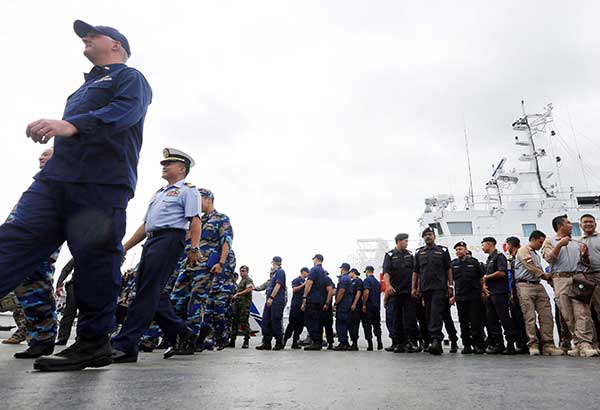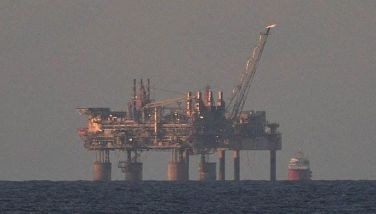Philippines, Chinese coast guards hold maritime exercises

Coast guard men from Brunei, Malaysia, Indonesia, Singapore, Sri Lanka, Thailand, the US and the Philippines gather at the PCG headquarters in Port Area, Manila for the opening of the Southeast Asia Cooperation and Training exercises yesterday. EDD GUMBAN
MANILA, Philippines - Despite China’s creeping occupation of land features within Philippine waters, the Philippine Coast Guard (PCG) has embarked on a joint maritime law enforcement operation with its Chinese counterpart in accordance with President Duterte’s instructions.
PCG spokesman Commander Armand Balilo said that since President Duterte’s visit to China last year, the PCG has established better rapport with the Chinese Coast Guard, while maintaining good relations with the United States Coast Guard (USCG).
“The Philippine Coast Guard has received guidance from the President to cooperate and forge an agreement with the Chinese Coast Guard (CCG), so we have clear cut guidelines from the President,” Balilo said. “Our actions are aligned with the guidance of President Duterte.”
Aside from a series of meetings with the CCG, the PCG sent 20 of its officers to China last May for a two-week law enforcement training. Also in the works is a visit of a CCG ship to the Philippines possibly next month.
Balilo said improving relationship with China is in the best interest of the PCG as it would enhance the skills of its personnel in combatting sea piracy, terrorism and illegal drugs – the problems Duterte wants immediately addressed.
The PCG is also currently collaborating with the USCG and with the coast guards of six other member-countries of the Southeast Asia Cooperation and Training (SEACAT) exercise.
SEACAT, an annual multilateral maritime security information sharing exercise, began yesterday and would run for two weeks.
This is the first time the PCG is hosting SEACAT. The other SEACAT member-countries are Brunei, Thailand, Singapore, Malaysia, Indonesia and Sri Lanka.
He said that since the PCG is a civilian agency, it could hold maritime exercises with other countries even if there is a raging dispute over territories in the region.
“This is the beauty of the PCG, we would make exercises or training with all countries that concern law enforcement, which is the function of the PCG. As for the territorial dispute, we leave it to the Department of Foreign Affairs,” Balilo said.
“As far as the PCG is concerned, we would foster one law enforcement interoperability doctrine wherein everyone may participate, including the US and China. We would have one framework because what we are talking about here is drugs and terrorism,” he added.
One of the highlights of the exercise is the conduct of maritime interdiction operation or visit, board and search and seizure workshop to be conducted by the USCG Law Enforcement Detachment.
To join the workshop are representatives from the PCG, Philippine Navy, Indonesian Coast Guard, Indonesian Navy, Sri Lanka Navy, Royal Thai Navy and Thai Maritime Law Enforcement Coordinating Center.
The PCG would be utilizing three of its ships – the BRP Corregidor, BRP Davao del Norte and BRP Capones – for the boarding exercise.
Balilo said the PCG hopes to get new insights from the USCG-initiated exercises, especially on dealing with rules of engagement issue.
He cited the May 9, 2013 Balintang Channel incident wherein a Bureau of Fisheries and Aquatic Resources boat, manned by PCG personnel, chased a Taiwanese fishing boat found poaching in Philippine waters.
The PCG fired warning shots but accidentally hit and killed a Taiwanese national on the boat.
Balilo said the USCG may also introduce force protocol, or the allowable force in an engagement, to avoid violation of human rights.
“There would also be a lecture on vessel on maritime law enforcement. So our men, when they conduct vessel boarding procedure, would be aware of the laws that they need to implement not only within our territorial waters, but even when they are in the continuous zone and the exclusive economic zone. So we would learn from them about what is acceptable in the international community.”
Earlier, Supreme Court Senior Associate Justice Antonio Carpio said China – contrary to its commitment – was slowly occupying Sandy Cay in the West Philippine Sea. The new geological feature is some 2.5 nautical miles off Pag-asa Island.
- Latest
- Trending






























